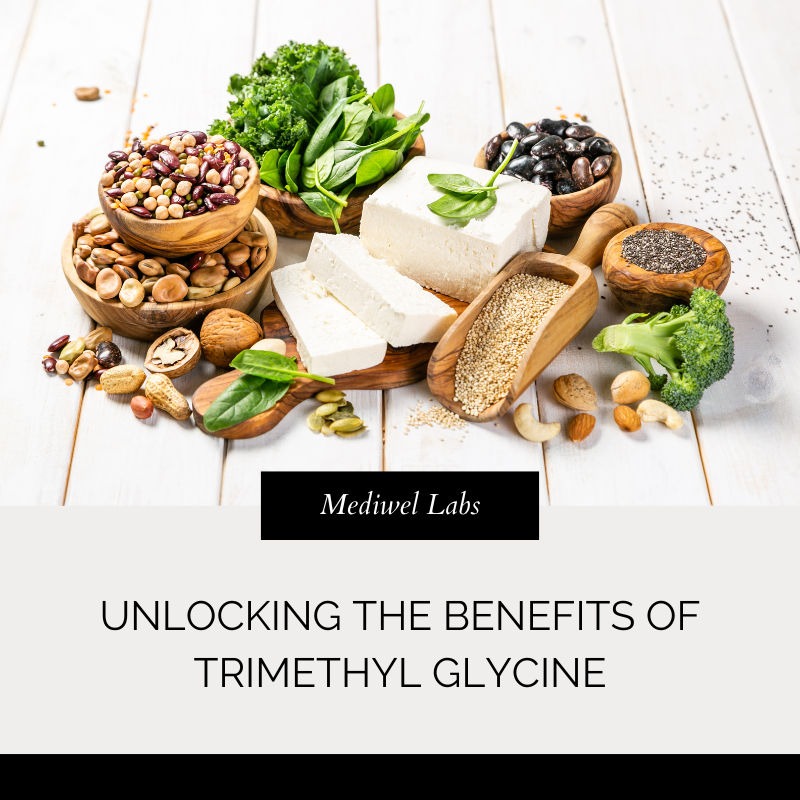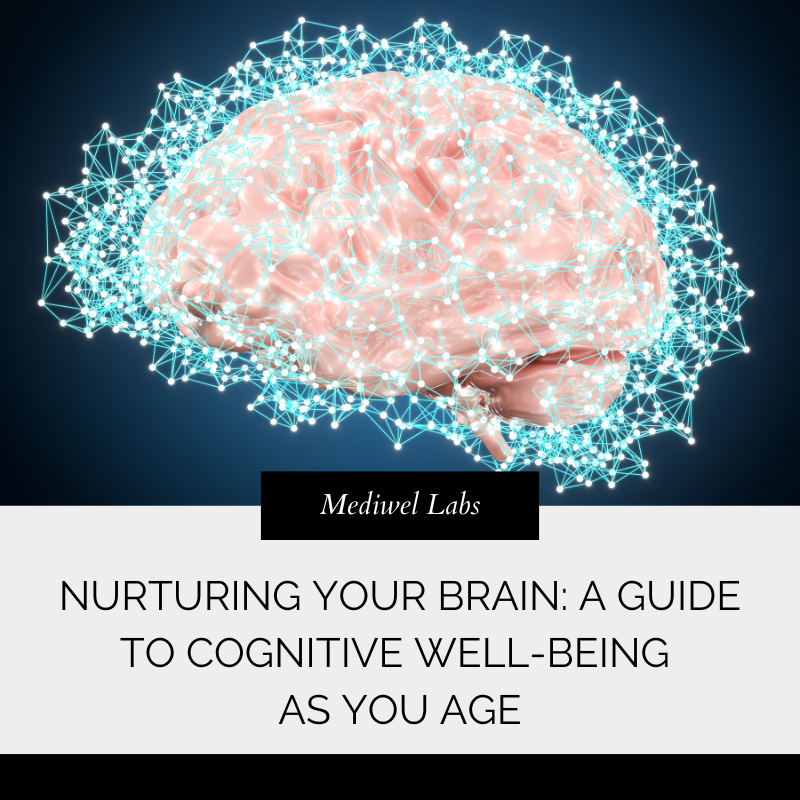What is Trimethyl Glycine?
Trimethyl glycine (TMG), also known as betaine, is a naturally occurring compound found in plants such as beets, spinach, and quinoa. It is a derivative of the amino acid glycine, with three methyl groups attached to it, which is where it gets its name.
TMG is known for its role in methylation, a core biochemical process in the body that influences a range of physiological functions. This compound has been known and used for a long time, but only recently has it gained widespread attention in the health and wellness community.
TMG plays a varied role in the body, mainly working as a methyl donor. This means it provides methyl groups necessary for many metabolic processes, including DNA methylation, which affects gene expression and cellular function.
TMG is important for the conversion of homocysteine to methionine, an essential amino acid. High levels of homocysteine are connected with cardiovascular diseases, making TMG important for heart health. Its presence in natural food sources means that adding it into the diet can be quite simple for those seeking its benefits.
Beyond its core biochemical roles, TMG has been studied for its potential good effects in various health conditions and overall wellness. Its ability to make liver function better, support detoxification, and improve cellular hydration is something to note.
As a result, TMG is not just another nutrient; it is a powerful compound that plays a big role in maintaining and promoting good health. Understanding how TMG works can help individuals make informed decisions about including it in their health regimen.
The Role of TMG in the Body
TMG’s main function is as a methyl donor, a role that is central in many metabolic pathways. Methylation is a process where methyl groups are transferred between molecules, influencing various biochemical reactions. This process is key for DNA repair and synthesis, detoxification, neurotransmitter synthesis, and the regulation of gene expression. Without enough methylation, many bodily functions could be impaired, leading to a variety of health issues. TMG’s contribution to methylation ensures that these processes run well.
Another key role of TMG in the body is in the metabolism of homocysteine, an amino acid that, in high levels, is associated with an increased risk of cardiovascular diseases. TMG helps convert homocysteine into methionine, another amino acid that is important for protein synthesis and various metabolic functions. This conversion process not only reduces homocysteine levels, helping cardiovascular health, but also ensures a steady supply of methionine for the body’s needs.
In addition to its role in methylation and homocysteine metabolism, TMG also supports liver function and detoxification. The liver is responsible for filtering toxins from the blood and breaking down harmful substances. TMG aids in the production of SAMe (S-adenosylmethionine), a compound that is vital for liver detoxification. By supporting the liver’s natural detox processes, TMG helps maintain overall health and prevents the accumulation of toxins in the body. This makes it a helpful nutrient for those looking to boost their body’s natural detoxification pathways.
Health Benefits of Trimethyl Glycine
The health benefits of TMG are wide-ranging, making it a good addition to any wellness routine. One of the main benefits is its impact on cardiovascular health. By lowering homocysteine levels, TMG reduces the risk of heart disease and stroke. High homocysteine levels can damage blood vessels and help with the formation of blood clots, leading to cardiovascular problems. TMG’s role in converting homocysteine to methionine helps reduce these risks and supports overall heart health.
Mental clarity and cognitive function are also helped quite a bit by TMG. Methylation is important for the production of neurotransmitters such as serotonin, dopamine, and norepinephrine, which are key for mood regulation, memory, and overall cognitive function. By ensuring good methylation, TMG supports the synthesis of these neurotransmitters, which helps improve mental clarity, focus, and emotional well-being. This makes TMG a good nutrient for those looking to boost cognitive performance and maintain mental health.
TMG also plays a role in supporting muscle function and endurance. It helps maintain cellular hydration by acting as an osmolyte, a substance that regulates fluid balance in cells. Good hydration is needed for muscle function, as it stops muscle cramps and boosts endurance. Athletes and fitness enthusiasts can benefit from TMG’s ability to maintain good hydration levels, improve exercise performance, and reduce the risk of dehydration-related issues. Also, TMG’s involvement in protein synthesis supports muscle repair and growth, making it helpful for those engaged in regular physical activity.
TMG and Athletic Performance
Athletes and fitness enthusiasts are always on the lookout for supplements that can help with performance, improve recovery, and support overall health. TMG has emerged as a strong supplement in this regard, offering many good points that can aid in athletic performance. One of the main ways TMG benefits athletes is by improving hydration and protecting cells from stress. As an osmolyte, TMG helps cells maintain their fluid balance, which is important during intense physical activity. Good hydration ensures that muscles function well, reduces the risk of cramps, and helps with endurance.
Beyond its hydration benefits, TMG also supports muscle repair and growth. During intense exercise, muscles undergo stress and micro-tears that need to be repaired for growth and strength gains. TMG aids in protein synthesis, which is key for muscle repair and hypertrophy. By ensuring good protein synthesis, TMG helps athletes recover faster from workouts and build muscle more well. This makes it a helpful supplement for those looking to improve their physical performance and reach their fitness goals.
TMG’s role in reducing homocysteine levels also supports overall cardiovascular health, which is important for athletes. High-intensity exercise can increase homocysteine levels in the body, possibly leading to cardiovascular issues. By converting homocysteine to methionine, TMG helps maintain cardiovascular health and reduces the risk of heart-related problems. This is especially important for endurance athletes who place a lot of stress on their cardiovascular systems. Adding TMG into their supplement regimen can help support heart health and make overall athletic performance better.
How to Incorporate TMG into Your Diet
Adding TMG into your diet can be simple, especially since it is found in several common foods. Beets are one of the best natural sources of TMG, making beetroot juice and beet-based dishes excellent choices for increasing your intake. Spinach, quinoa, and whole grains like wheat bran also contain a good amount of TMG. Including these foods in your regular diet can help ensure you get enough of this important nutrient. Also, seafood, such as shrimp and scallops, are good sources of TMG and can be included in a balanced diet for those who consume animal products.
For those looking to get more TMG, supplements are a convenient option. TMG supplements are widely available in health food stores and online, often in powder or capsule form. When choosing a supplement, it is good to think about the dosage and quality of the product. A common dose ranges from 500 mg to 2000 mg per day, but it is always best to begin with a lower dose and slowly increase it as needed. Consulting with a healthcare provider can help determine the right dosage based on individual health needs and goals.
Adding TMG into your diet can also be achieved through fortified foods and beverages. Some health products, such as energy drinks and protein powders, are fortified with TMG to boost their nutritional profile. These products can be a convenient way to increase your TMG intake, especially for those with busy lifestyles. But, it is good to read labels carefully and choose products that do not contain too many added sugars or artificial ingredients. By making wise choices, you can effectively add TMG into your diet and experience its many health benefits.
Potential Side Effects and Considerations
While TMG is generally considered safe for most people, it is good to be aware of some side effects and things to consider. Some individuals may experience mild gastrointestinal issues such as nausea, diarrhea, or bloating when taking TMG supplements, especially at higher doses.
Starting with a lower dose and slowly increasing it can help reduce these side effects. If gastrointestinal discomfort continues, it may be best to reduce the dosage or stop use altogether. It is always smart to consult with a healthcare provider before starting any new supplement regimen.
Individuals with certain health conditions should be careful when using TMG. For example, those with kidney disease or impaired renal function may need to avoid TMG supplements, as high levels of betaine can make these conditions worse. Also, individuals with a history of depression or bipolar disorder should consult with their healthcare provider before using TMG, as it can influence neurotransmitter levels and possibly affect mood. Pregnant or breastfeeding women should also seek medical advice before taking TMG supplements to ensure safety for themselves and their babies.
It is also important to think about how it might interact with other medications or supplements. TMG can interact with certain medications, such as those used to lower cholesterol or manage diabetes. It is key to inform your healthcare provider of all medications and supplements you are taking to avoid any bad interactions. Also, combining TMG with other methyl donors, such as folate or vitamin B12, can make its effects stronger but may also raise the risk of side effects. A healthcare provider can help determine the best way to add TMG into your health regimen safely and well.
TMG Supplements: What You Need to Know
When considering TMG supplements, it is important to choose good-quality products from reputable brands. Not all supplements are created equal, and the quality of ingredients can vary a lot between products. Look for supplements that are third-party tested for purity and potency, as this makes sure that you are getting a product that meets high standards of quality. Reading customer reviews and researching the brand’s reputation can also give helpful information into the effectiveness of the supplement.
The dosage of TMG supplements can differ depending on individual needs and health goals. A typical starting dose is around 500 mg per day, which can be slowly increased to 1000 mg or more as needed. Some individuals may get more out of higher doses, like athletes or those with specific health conditions.
However, it is important to follow the recommended dosage guidelines and avoid going over the maximum recommended dose without consulting a healthcare provider. Taking too much TMG can lead to unwanted effects and may not provide more benefits.
TMG supplements are available in various forms, including capsules, tablets, and powders. The choice of form depends on personal preference and convenience. Capsules and tablets are simple to take and provide a set dosage, while powders can be mixed into beverages or smoothies for a more flexible option.
Some individuals may prefer powders for their ability to adjust the dosage and add TMG into their daily routine more easily. Regardless of the form, it is important to store TMG supplements in a cool, dry place to maintain their potency and shelf life.
Getting the Most from TMG
Trimethyl glycine is a powerful nutrient with a wide array of health benefits, from supporting cardiovascular health to improving cognitive function and athletic performance. Its role as a methyl donor makes it key for many metabolic processes, including DNA repair, detoxification, and neurotransmitter synthesis.
By adding TMG into your diet through natural food sources or supplements, you can experience its impressive health benefits and support overall well-being.
When using TMG supplements, it is important to choose good-quality products and follow recommended dosage guidelines. Consulting with a healthcare provider can help determine the right dosage and ensure safety, especially for individuals with specific health conditions or those taking other medications.
By being mindful of potential side effects and interactions, you can effectively add TMG into your health regimen and get the most out of its benefits.
As scientific research continues to reveal the many ways TMG supports health, it is clear that this nutrient holds great potential for improving various aspects of well-being. Whether you are looking to boost your cardiovascular health, improve cognitive function, or make athletic performance better, TMG is a good addition to any wellness routine. By understanding the science behind TMG and making informed choices, you can use its full potential and enjoy the many benefits it has to offer.




Leave a comment
This site is protected by hCaptcha and the hCaptcha Privacy Policy and Terms of Service apply.